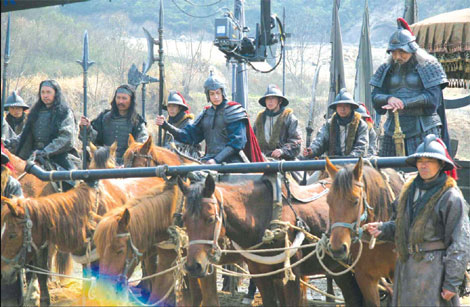Something 'fishy' about this trick
Updated: 2011-02-18 11:08
By Li Jing, Hu Yongqi and Duan Yan (China Daily European Weekly)
 |
|
The director of the TV drama Romance of Three Kingdoms said that six horses were killed during filming. Provided to China Daily |
Role of the media
The fourth estate has not been a dumb spectator altogether. There have been several instances where the media has championed campaigns to check cruelty towards animals.
In August 2009, Gao Xixi, the director of the 90-episode epic TV drama Romance of Three Kingdoms, said in an interview to Life Week magazine, a leading domestic magazine, that during the filming of the war scenes, six horses were killed while eight others went mad. "Even horses could not bear it, so you can imagine what kind of war scene it was.
Gao's statements drew public ire and came in for flak from several quarters.
Lu Di, founder of the Beijing-based China Small Animal Protection Association flayed Gao and his unit for abusing and killing the horses.
But Gao quickly defended his perch with a complete denial of his earlier statements. "They (horses) were all sick, and we tried our best, but could not save them."
To show his seriousness over the matter, Gao and his unit welcomed reporters to his sets and showed the care they were lavishing on the horses. There were also organized photo shoots of Gao and the lead actors feeding apples to the horses. "Horses are very expensive, and there is no way that we can afford to lose them," says Gao.
Later, when the show was on air, the war scenes depicting injured and dead horses once again kicked up a furor in the public domain.
Gao then changed his response and said that only one horse had died after catching a cold, according to the Shanghai Morning Post. Wang Xiaofeng, the reporter of Life Week magazine, however, says what he wrote was true and the interview was recorded. "Maybe Gao Xixi has done so many interviews that he cannot remember what he said."
Zhang Dan, co-founder of China Animal Production Media Salon and a reporter with Fortune Magazine, told China Daily that representatives from Gao's unit have visited animal protection groups and tried to explain that they were looking after the horses. But Zhang thinks that instead of admitting the mistakes, Gao's change of stance on his earlier interviews shows his insincerity towards animal protection.
Tinsel troubles
Stories of maltreating animals in film productions abounded the Chinese press in 2008. Film director Yao Shougang said in a CCTV interview that when he made his movie Dog King 15 years ago, he blew up an actual dog with a live bomb to make his scenes look more authentic. "The soldier who spent several years training the dog was inconsolable after seeing the film," says Yao. He went on to add that "in order to alleviate the suffering of the dog, be sure to kill it off once and for all".
Fetish videos of animal abuse are also hot crazes on the Internet. Last year, a four-minute video of a woman abusing a rabbit was the rage on the web circuits. Angry Chinese Internet users soon started to post comments and sought the actual identity of the woman. The actual woman later came out with a public apology.
But an online post in Tianya.cn, one of China's largest online forums, revealed that the video was not just an isolated incident made by a mentally challenged individual. There were several instances of women who were actually hired to perform similar acts. The videos of such acts were later on sold to foreign websites for huge amounts of money, the post says.
Without any legal weapons, animal protection campaigners admit that they are treading on thin ice as the only course left for them is to make emotional appeals.
The country unveiled the draft of its first animal welfare legislation, the China Animal Protection Law, in September 2009. Drafted by a law professor from the Chinese Academy of Social Sciences, the proposed bill criminalizes abuse, abandonment of pets and inhumane slaughter of animals.
Chinese animal lovers hailed the document as a boon for stray cats and dogs that were often beat to death, or for the bears whose bile was extracted for medicinal purposes.
In early 2010, after seeking public suggestions, the draft was rechristened as the Anti-Animal Cruelty Law, and added new clauses like forbidding animal abuse by starvation in zoos and animal slaughter in the presence of the underaged. The draft was later submitted to the Standing Committee of the National People's Congress, the nation's top legislator.
However, the draft was never made into a formal legislation, says Qin, as pressure from some related business sectors might have blocked the progress.
"If the law gets passed, many industries would face restrictions or limitations, for instance, the fur dealers and the catering businesses which serve animals other than livestock," she says.
The absence of an animal protection law also resulted in the indifference by some media outlets towards animal abuse cases, says Zhang Dan, the co-founder of Chinese Journalists Association for Animal Protection.
"Understanding of some basic concepts, such as animal welfare, abuse and protection, was quite poor among general reporters when we started the project in 2009," says Zhang, who also works for the US-based Fortune Magazine's Beijing bureau.
"I was shocked to see a TV program in praise of a Chinese entrepreneur who runs a bear farm to extract bile in a really cruel way," she says, "and the program didn't even realize the cruelty towards the animal."
In what Zhang called a "self-education" process, the association tried to involve intellectuals, animal protection groups, journalists and the public to focus on both specific animal abuse cases and more general topics such as law drafting.
The increased media attention has led to the improved public awareness, says Qin Xiaona from the Capital Animal Welfare Association.
"I was glad to see that the first charges against the goldfish trick came from the public in online forums," says Qin.
"But to change the conventional mindset of the public - that animals are not worth the care - we still have a long way to go. And what will make our job easier is legislation," she says.
Li Li contributed to this story.
E-paper

Ear We Go
China and the world set to embrace the merciful, peaceful year of rabbit
Preview of the coming issue
Carrefour finds the going tough in China
Maid to Order
Specials

Mysteries written in blood
Historical records and Caucasian features of locals suggest link with Roman Empire.

Winning Charm
Coastal Yantai banks on little things that matter to grow

New rules to hit property market
The State Council launched a new round of measures to rein in property prices.
